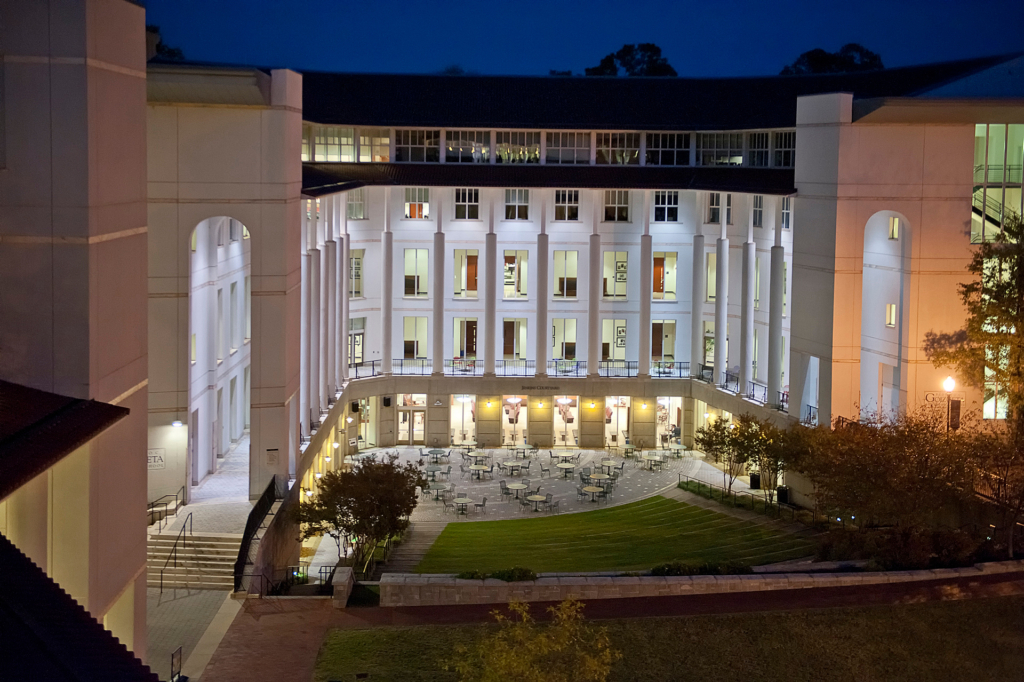
Emory University Goizueta Business School. Courtesy photo
Last month, The Wharton School shook up the Executive MBA market by becoming the first top-five program to offer an online MBA. Its new Global MBA For Executives will welcome its first cohort in May 2023, and students will complete three-fourths of the program in online synchronous sessions.
The move is part of a larger trend in executive education to offer more options to executives demanding greater flexibility. Emory University’s Goizueta Business School has been an early adopter.
Along with its traditional weekend on-campus EMBA, the school now offers both hybrid and 100% online formats. All three offer the same foundational general management courses and the chance to customize the program via its electives. The only difference in the three formats is the delivery, says Jaclyn Conner, associate dean for executive MBA programs at Goizueta.
“All three have the exact same faculty, exact same classes, exact same assignments, and the same content for orientation. All of our students are able to participate in a global business trip as well. All of their leadership and executive coaching components are the same,” Conner tells Poets&Quants. “Times have changed for working professional people. Having gone through this pandemic, people value their time more than anything these days. We need to accept that, and we need to nurture that for our executive level population of students.”
EXPANDING EMBA OPTIONS TO EXPAND REACH
Goizueta launched its hybrid format in 2020 after an 18-month research effort that found that prospective students increasingly are seeking greater flexibility, and the time students could commit to on-campus learning was getting shorter and shorter. A fully online program was the logical next step, and it announced in February that it was launching one, making it the highest-ranked program to create a 100% online EMBA so far. This August the first cohort of 22 students enrolled.
For this academic year, Emory Goizueta admitted 110 students and enrolled 67 across its three EMBA formats.
The school ranked No. 8 in Poets&Quants latest EMBA ranking, a composite ranking that takes into account schools’ performance of their U.S.-based programs in the three major EMBA rankings: U.S. News & World Report, the Financial Times, and The Economist. Goizueta ranked No. 16 in U.S. News, 12 in FT for U.S. schools, and No. 11 in the Economist’s 2020 ranking. (The Economist, which announced this summer that it was killing its MBA ranking because of withering criticism, did not release an EMBA ranking in 2021, so we used its 2020 ranking for this composite.)
This week, Poets&Quants reached out to Emory to check on its first online cohort as well as its other EMBA formats. It is the first school featured in our new series, EMBA Spotlight, which aims to highlight the larger trends in the executive MBA while pinpointing what makes each program unique.
Our conversation with Jaclyn Conner, who has worked in the online space for about 20 years, is presented below, edited for length and clarity.
Let’s begin with an overview of Goizueta’s EMBA portfolio.
For us, what we stress in our Executive MBA is that all of the formats really are the same as far as content and curriculum. It's truly about just the delivery that a student desires.
Our Executive MBA Program provides a general management foundation for the first two semesters with the opportunity to really customize your MBA experience by having a multitude of electives to choose from in the third, fourth and fifth terms. So it is a five term program, and students typically complete the program in 18 months, but it can't be completed as quickly as 15 months.
What does the program format, cohort size, etc., look like for the in-person program?
Those classes take place every other weekend, and classes are typically Friday nights starting at 5 p.m., and then all day on Saturdays. The goal is that we minimize students having to take off time from work.
They have access to all of the same faculty that we have across all the other formats as well. And then the on campus students also have the option of going on the global trip.
The cohort size has really ranged over time. We've had class sizes as large as 80 students. I think the smallest class size we've ever had was 30. But I would definitely say our sweet spot is probably around 45 to 50 students in the on-campus cohort.
NEXT PAGE: Admission cycle trends + Hybrid and online formats





Questions about this article? Email us or leave a comment below.